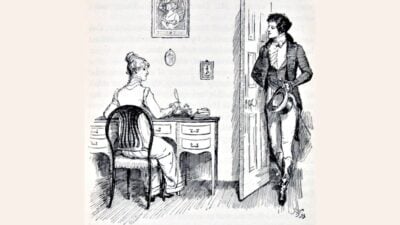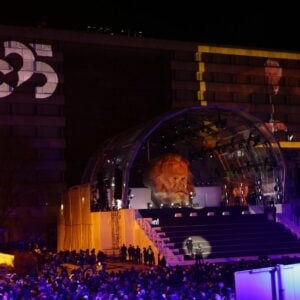
Cook the Fish ’n Chip, Dracula’s Here!

There are plenty of good reasons to take a side-trip to the little town of Whitby when visiting the UK, but three we particularly like are James Cook, fish and chips and Dracula.
A place of around 14,000 hardy souls who have learned to live with the hammering winds that can howl in off the North Sea in winter, Whitby sits astride the Esk River in North Yorkshire—on its eastern banks it is postcard-perfect rustic England and on its western side a newer sprawl of red-roofed cottages rambling up sometimes challenging slopes.
In summer Whitby becomes one of the nicest little off-the-beaten-track towns in England to visit. Tourists flock here to enjoy sunny strolls along its harbour-front, explore local markets and museums, browse the antique stores and eat fish and chips in colourful little outdoor cafés, in restaurants adorned with window boxes ablaze with fire-engine-red geraniums and with pints in pubs whose chefs have turned battered haddock and golden potato chips into an art form.
And when taking to the narrow alleyways in search of history, the visitor finds in Grape Lane the one-time home of Quaker ship-owner John Walker and the seafarer student who lodged in his attic from 1746 to 1749—James Cook.
Captain Cook was born at Marton-in-Cleveland and was apprenticed to a grocer in nearby Staithes. But his real love was the sea, and he asked Mr Walker, who lived close-by in Whitby, if he would teach him seamanship and navigation.
Today the Captain Cook Memorial Museum that occupies Mr Walker’s restored terrace house is furnished down to the finest detail much as it would have been in Cook’s time.
Visitors can browse four floors of memorabilia reflecting the life and explorations of the great navigator and the building of the Endeavour in Whitby…
They can also find a statue of Captain Cook on West Cliff that was given by Australia and New Zealand to honour his extraordinary achievements.
And if visiting Whitby on the morning of Ascension Day—40 days after Easter Sunday—they can witness a group of civic and business dignitaries making apparent dopes of themselves as they squelch through the mud of the harbour floor at low tide—to plant a hedge before the tide comes back in.
This bizarre ritual dates back to 1159 when three Norman noblemen on a pig-hunt discovered a monk giving comfort behind a hedge in a hermitage to a boar they had staved.
They beat monk and beast to death, yet as he lay dying the monk prayed that God would forgive them, provided that every Ascension Day a group of „noblemen“ erect a hedge on the mudflats of the Harbour—or lose title to their lands.
And to make their task all the more difficult, they could use only simple „penny pocket knives“ such as that carried by the monk.
Almost 150 years on, the ritual continues—and if the so-called „Penny Hedge“ does not survive three incoming tides, it has to be built again.
Up the hill overlooking the Esk Estuary are the remains of the grand Whitby Abbey founded by St Hilda in 658AD and rebuilt in the Middle Ages, and across the harbour at Number 6 Royal Crescent the building in which author Bram Stoker had once stayed—and where during a raging North Sea storm he decided that Whitby would be „where my Count Dracula will come ashore from Transylvania.“
During the storm Stoker learned of the Russian schooner Dimitri of Narva sinking on the nearby Tate Sands while making for the safety of Whitby—in his book he has Dracula coming ashore „during a ferocious storm“ on the Russian ship Demeter of Varna…
And just 15km from Whitby is tiny Goathland—TV’s Aidensfield of Heartbeat fame, complete with the Aidensfield Arms Hotel, Mostyn’s Garage, the Village Store and Greengrass’s farm … but not the Police Station—the scenes involving that were shot in nearby Leeds.
Whitby with its connections to Captain Cook—let alone all its other attractions—is an almost must-do for Australians visiting the UK; see travel agents or check out www.visitbritain.com.au , www.cookmuseumwhitby.co.uk or www.whitbyarchives.org.uk




























vielen Dank, dass Sie unseren Kommentar-Bereich nutzen.
Bitte verzichten Sie auf Unterstellungen, Schimpfworte, aggressive Formulierungen und Werbe-Links. Solche Kommentare werden wir nicht veröffentlichen. Dies umfasst ebenso abschweifende Kommentare, die keinen konkreten Bezug zum jeweiligen Artikel haben. Viele Kommentare waren bisher schon anregend und auf die Themen bezogen. Wir bitten Sie um eine Qualität, die den Artikeln entspricht, so haben wir alle etwas davon.
Da wir die Verantwortung für jeden veröffentlichten Kommentar tragen, geben wir Kommentare erst nach einer Prüfung frei. Je nach Aufkommen kann es deswegen zu zeitlichen Verzögerungen kommen.
Ihre Epoch Times - Redaktion